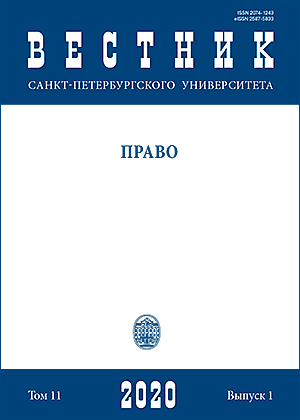The civil status of entrepreneurial associations in the context of European and Russian legislation harmonization
DOI:
https://doi.org/10.21638/spbu14.2020.104Abstract
The article contains a study of the question of the correlation between the legislative definition of the subject of Russian private law and the requirements of modern international economic turnover. A review of the laws on business associations and the practice of their application in Russia makes it possible to identify the tendency to spread the doctrine of control and the doctrine of a single economic interest. These doctrines can effectively protect corporate interests while entrepreneurial associations have only organizational and economic unity. For the practical activities of entrepreneurial associations both in Russia and in Europe, these characteristics are necessary and sufficient. In general, it should be recognized that the concept of a legal entity, its civil status, its legislative features and legal personality are important only for the resolution of contractual disputes. And, as the practice of applying corporate norms shows, the design of a legal entity in relation to entrepreneurial associations becomes an encumbrance that hinders, on the one hand, the effective conduct of business, and, on the other hand, effective state control over the financial, tax and competitive activities of participants in the economic turnover. Taking into account the fact that each collective entity finds its activity both in the sphere of contractual regulation and in the sphere of corporate relations, the norms currently contained in the Russian Civil Code on the classification of subjects of law, the notion and features of a legal entity cover only one aspect of the life of collective actors and limit its manifestations in the sphere of corporate relations. It is proposed to expand the idea of collective subjects of private law. The practical expediency of giving civil status to entrepreneurial associations is substantiated.
Keywords:
subject of private law, harmonization, legal entities, banking groups, the doctrine of single economic interest, corporation, civil liability
Downloads
References
Downloads
Published
How to Cite
Issue
Section
License
Articles of "Vestnik of Saint Petersburg University. Law" are open access distributed under the terms of the License Agreement with Saint Petersburg State University, which permits to the authors unrestricted distribution and self-archiving free of charge.






